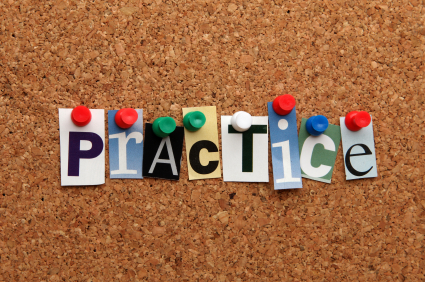I wrote a while back about the concept of deliberate practice, which is basically the idea that if you want to achieve mastery of something you need to (a) practice a lot, and (b) practice well. A study I came across more recently, however, suggests that practice may not be the key to greatness that writers like Malcolm Gladwell have made it out to be.
While there is little doubt that continuous deliberate practice does improve performance, it may still not be enough to enable the leap from good to great. Recent research suggests that the capacity of your working memory – the part of memory that actively process new information as we encounter it – may be a more important factor. Dr. Zach Hambrick, an associate professor of psychology at Michigan State University, says that “While the specialized knowledge that accumulates through practice is the most important ingredient to reach a very high level of skill, it’s not always sufficient.” Intellectual ability matters, and “the jury’s still out” on exactly how much control we have when it comes to enhancing our natural intellectual abilities.
This may feel like bad news to some learners, but it is important to remember that practice does lead to improvement, regardless of intellectual ability. So, while some may be satisfied with nothing less than greatness, there is much to be said for a life of continuous growth and improvement. Deliberate practice can certainly contribute significantly to that goal.
Jeff
P.S. – Serendipitously, the day after I published this, the New York Times published an editorial by Zach Hambrick: Sorry, Strivers: Talent Matters






Interesting. I guess it stands to reason that a person’s working memory could be a limiting factor in their learning, in the same way that a sprinter’s speed is limited by the amount of fast twitch muscle they are able to develop.
I just hope this information won’t be used as an excuse for students to slack off! (“There’s no point in me doing my homework as I lack the mental capacity to become a great English speaker!”)
Of course, as you say, practice does lead to improvement, and there is no doubting that. I have just started learning the guitar despite never doing anything musical in my life, and am determined to work hard at it despite the apparent hurdle of being musically useless!
Stephen,
I agree with that – both intuitively and based on my own experience – but I suspect Hambrick would argue that someone who started with more working memory in the first place would still have an advantage.
Jeff
I think that you’d find that someone who practices a great deal has – as a consequence of that practice – a greater working memory.
This is because working memory is not an absolute – it’s not like a buffer in a computer, which stores a discrete amount of data – but rather something that depends on prior knowledge and context.
The chess player, for example, can store ‘Ruy Lopez’ in working memory with plenty of room to spare, while a novice will have to remember the individual moves that constitute the opening, which may overfill working memory.
Like most everything in life, the answer often becomes ” it depends” I can see where intelligence can be a potent factor in some disciplines, where in others maybe not so much. In either case, keep practicing, because that is what is under our control – I can’t do anything about my DNA at this point!
Good points, Subhorup. Thanks for sharing them. I’d agree that motivation and engagement, in particular, are very important for something as complex and time-consuming as learning a language. Though I did not mention it in the post, I think the concept of competence and the process of building competence one step at a time are also very important. Deliberate practice can contribute greatly to the competence-confidence loop.
https://www.missiontolearn.com/2011/10/competence-and-learning/
Jeff
Interesting line of thought. My adult experiences with trying to acquire new skills tells me that the working memory capacity theory holds true especially for older people. Spontaneity, motivation and engagement are other important aspects that can influence successful learning for all ages. Practice cannot help if you are not inspired and engaged with what you are trying to learn. Pancakes for example!